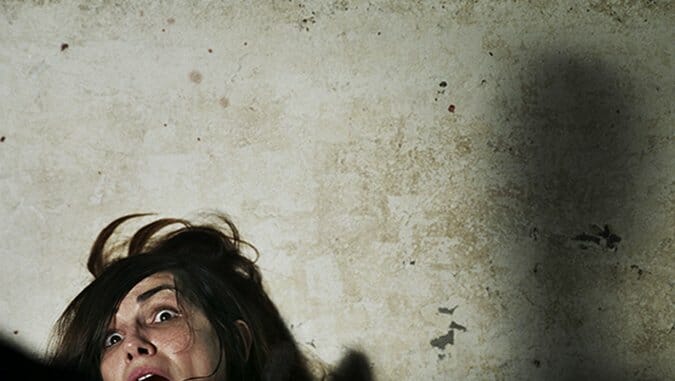Alleluia

A supremely nasty, deeply unnerving work that exists at the intersection of psychosexual co-dependency and homicide, Belgian filmmaker Fabrice Du Welz’s Alleluia locates a singular, engrossing, fever-dream-like physical infatuation and then mines that seam in our collective unconscious for all the uncomfortableness it’s worth. A Directors’ Fortnight premiere at the 2014 Cannes Film Festival, and loosely based on the lurid story of the “lonely hearts” serial killers of the 1940s (subsequently immortalized in Leonard Castle’s 1969 film The Honeymoon Killers) this arthouse entry breathes life into one of the more darkly memorable killers in recent screen history: a woman who derives scary power from the traditional tropes that usually surround a “queen bee” type jealousy.
Alleluia opens on morgue attendant Gloria (Lola Duenas), a divorcee and single mother whose friend goads her into answering a personal ad. On her first date in ages, Gloria is swept off her feet by Michel (Laurent Lucas), a smooth-talking shoe salesman who posits that footwear affords a window into someone’s soul. Michel, as it turns out, is an inveterate womanizer and professional hustler, wooing older women to satisfy both his corporeal desires and his criminal lifestyle. His intense attention, however, awakens a dangerous obsessiveness in Gloria. When she finds out about his serial philandering and debts, she doesn’t kick him to the curb, but instead gives him money and pledges her devotion to him, promptly stowing her tween daughter with a friend. When Michel takes another widow, Marguerite (Edith le Merdy), as his wife, Gloria initially poses as his needy sister. In a fitful moment of rage, however, she interrupts their coupling, murdering Marguerite. Their odyssey of instability only gets messier from there.
Co-written by Du Welz and Vincent Tavier, Alleluia has some fun with religious symbology—“I invoke the presence of the elementals to take part in this ritual,” says Michel in a weird moment of private invocation prior to his first date with Gloria—but it’s mainly a two-handed character study which takes dark delight in slowly turning audience sympathies toward Michel, who is no angel himself but not animated by the same physically violent impulses as Gloria. With its focus on stylized disquiet and wide-eyed mania, portions of Alleluia faintly recall Amer, Helene Cattet and Bruno Forzani’s 2009 triptych giallo. Du Welz’s stagings take on a woozy, nightmarish quality (with a special hat tip to cinematographer Manuel Dacosse’s close-ups and weighted frames), including an amazing musical sequence that totally works despite being a tonal one-off. Some of Alleluia’s images will haunt a viewer long after a screening.
-

-

-

-

-

-

-

-

-

-

-

-

-

-

-

-

-

-

-

-

-

-

-

-

-

-

-

-

-

-

-

-

-

-

-

-

-

-

-

-








































